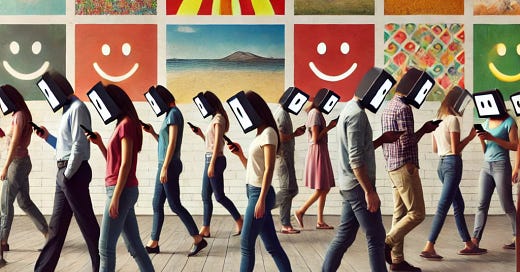I know your Jimmy has a degree, a new Mac and iPhone. But I'm sorry Mr. and Mrs. Smith, he's as dumb as a stump. It's cultural, nothing to do with lead paint. He has never held a thought in his head.
When students are bragging about having degrees where they never had to read a book you have a problem.
If you believe in the importance of free speech, subscribe to support uncensored, fearless writing—the more people who pay, the more time I can devote to this. Free speech matters. I am a university professor suspended because of a free speech issue, so I am not speaking from the bleachers. The button below takes you to that story if you like.
Please subscribe and get at least three pieces /essays per week with open comments. It’s $5 per month and less than $USD 4. I know everyone says hey, it’s just a cup of coffee (with me, not per day but just one per month), but if you’re like me, you go, “Hey, I only want so many cups of coffee!” I get it. I don’t subscribe to many here because I can’t afford it.
But I only ask that when you choose your coffee, please choose mine. Cheers.
If data and information were water, we would live deep in the oceans. Yet with all this information, this history, this vast foundation of post-enlightenment teaching, how are we so stupid?
The term “stupid” should not be taken as a childish slur but as an expressure of cognitive and self-awareness failure.
But why?
Ignoring Consequences is less painful:
Who has time for introspection when social approval is just a tweet away? Instead of trudging through the messy work of ethical reasoning, we opt for the far more glamorous route of showing off our moral “superiority.” Several psychological and sociological mechanisms explain this all-too-human shortcut:
As social creatures, we are biologically wired for validation. Publicly flaunting our moral credentials—especially if they align with current norms—wins us a bounty of praise, approval, and maybe a few followers. This turns morality into a performance, with sincerity optional.
2. Cognitive Laziness: Why Think Deeply When You Don’t Have To?
Signalling virtue is the intellectual equivalent of a microwave dinner: quick, easy, and utterly devoid of complexity. The real moral examination requires effort—deep thought, self-criticism, uncertainty—exhausting. Signalling allows us to skip the hard stuff entirely. You hear the information you don’t like; you have just to press a few rhetorical buttons in your brain and let your mouth spout on names, easy, peezy.
3. Cultural Incentives: Virtue for Likes
Ah, social media—the platform where virtue signalling goes to thrive. Likes, shares, and retweets become the currency of moral posturing, incentivizing shallow, performative acts of virtue over anything that requires nuance or humility.
4. Moral Tribalism: Loyalty Over Logic
In today’s polarized world, moral signalling isn’t about understanding—it’s about allegiance. Aligning with your tribe is paramount, and moral questions are flattened into good versus evil. There is no time for complexity when loyalty is at stake. Liberalism is cool and hip; it has shades of rebellion. Conservative, it sounds like a fat old white guy convention.
5. Moral Licensing: One Good Deed Is Enough, Right?
Virtue signalling can act as a form of moral licensing: perform one symbolic act, then coast on your self-righteousness. You can now conveniently ignore the rest of your ethical inconsistencies—after all, you’ve done your bit. I haven’t visited my gran with Alzheimer’s for months, but look at me; I glued myself to the road for climate change.
6. Surface-Level Morality: Slogans Over Substance
Why wade into the murky waters of genuine moral engagement when a catchy slogan will do? Virtue signalling thrives on easily digestible phrases that don’t require anyone to think too hard, conveniently avoiding deeper ethical inquiries. It is like eating two protein bars for supper, but ones that weren’t just trumped up granola and sugar.
Virtue signalling triumphs over real moral examination because it’s easy, socially rewarded, and requires minimal effort. Rather than confront uncomfortable ethical dilemmas, we opt for quick hits of moral validation. The result? A hollow, performative morality that values applause over principle.
7. When self-hatred becomes a cultural virtue,
Society spirals into moral masochism, where the new form of moral enlightenment is tearing oneself apart. Once a tool for growth, self-critique devolves into a performative spectacle of self-flagellation, where individuals and groups compete in a perverse game of “who can hate themselves the most.”
The critical thinking that once defined introspection is replaced by blanket guilt. Why bother understanding history, culture, or identity nuances when you can issue sweeping condemnations?
Constant self-loathing leaves little room for productive action. When you’re too busy apologizing for existing, meaningful change becomes impossible—everything’s a sin, so why try?
Finally, virtue signalling reaches peak absurdity. Self-hatred becomes a badge of honour—wearing your guilt publicly is the ultimate way to show off your moral “awareness.” But underneath, it’s all hollow posturing.
There’s no room for actual progress when the aim is to wallow in guilt instead of, you know, doing something constructive. But conservatives have a branding problem, and until it’s fixed, being left-wing will always be cooler.
.
Please subscribe and get at least three pieces /essays per week with open comments. It’s $5 per month and less than $USD 4. I know everyone says hey, it’s just a cup of coffee (with me, not per day but just one per month), but if you’re like me, you go, “Hey, I only want so many cups of coffee!” I get it. I don’t subscribe to many here because I can’t afford it.
But I only ask that when you choose your coffee, please choose mine. Cheers.









